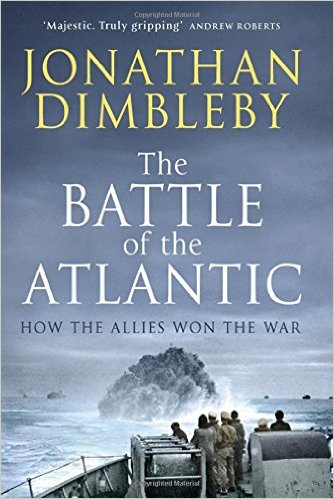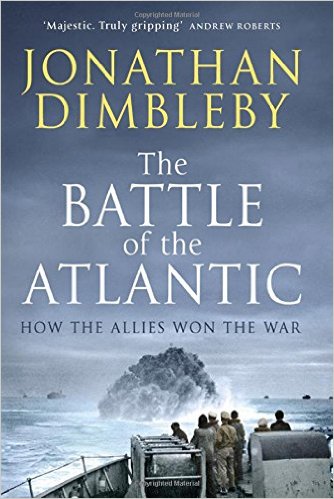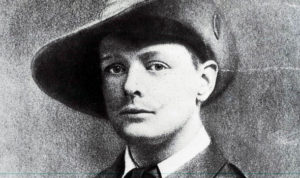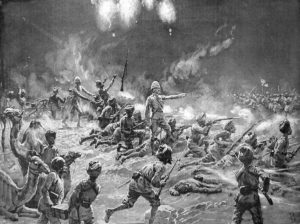Finest Hour 172
Books, Arts, & Curiosities – The War at Sea

June 12, 2016
Finest Hour 172, Spring 2016
Page 46
Review by Kevin D. McCranie
Jonathan Dimbleby, The Battle of the Atlantic: How the Allies Won the War, Viking, 2015, 560 pages, £17. ISBN 978-0241186602
 The Battle of the Atlantic, the longest sustained campaign of the European theater in the Second World War, began with the outbreak of hostilities in September 1939. It continued to rage right up to the German surrender in 1945. Yet, the term “Battle of the Atlantic” is a misnomer, according to Jonathan Dimbleby. Rather than a traditional Trafalgar-like battle, the Atlantic struggle encompassed a series of naval campaigns over an expansive geographical region from the icepack in the Arctic deep into the vastness of the South Atlantic. The primary German weapon was the U-boat. The desired victim was merchant shipping with the object of attacking Britain’s greatest vulnerability: its critical dependence on resources coming from overseas.
The Battle of the Atlantic, the longest sustained campaign of the European theater in the Second World War, began with the outbreak of hostilities in September 1939. It continued to rage right up to the German surrender in 1945. Yet, the term “Battle of the Atlantic” is a misnomer, according to Jonathan Dimbleby. Rather than a traditional Trafalgar-like battle, the Atlantic struggle encompassed a series of naval campaigns over an expansive geographical region from the icepack in the Arctic deep into the vastness of the South Atlantic. The primary German weapon was the U-boat. The desired victim was merchant shipping with the object of attacking Britain’s greatest vulnerability: its critical dependence on resources coming from overseas.
The subtitle of Dimbleby’s book, How the Allies Won the War, is certainly provocative but reflects his thesis that the Atlantic battle was the decisive struggle in the war. To prove his point he quotes President Franklin Roosevelt: “I believe the outcome of this struggle is going to be decided in the Atlantic” (xxvi). Nothing, to Dimbleby, more clearly explains the battle’s significance. He maintains that nearly everything else in the war was contingent upon the grinding, attritional campaign occurring in the stormy waters of the Atlantic.
The quality of Dimbleby’s prose makes this enjoyable reading. He describes issues and events both large and small from the impact of rationing in Britain to the terror of being in a U-boat under attack by a deluge of depth charges. Particularly, Dimbleby’s use of quotations from those who were there allows the reader to begin to feel the suffering, suspense, and even fear associated with the Battle of the Atlantic.
Dimbleby adopts a largely chronological approach but mixes in thematic chapters to describe things such as the impact of the Battle of the Atlantic on British society, the significance of Allied code breaking, and the arduous PQ convoys destined for the Arctic ports of the Soviet Union. Through all of this, the thesis of Dimbleby’s narrative is clear: this is the struggle that is key to understanding the outcome of the Second World War.
Churchill serves as the prime protagonist. As First Lord of the Admiralty in the opening stage of the conflict and later as Prime Minister, he made decisions that had significant influence on the outcome of the campaign. These included assessments about the allocation of resources, the direction of the war effort, the need to support the Soviets with Arctic convoys, and the availability of long-range aircraft to search for and attack U-boats in the Atlantic. Churchill both influenced the battle and was influenced by it.
Dimbleby has written a page-turner aimed primarily at general readers interested in history and particularly the Second World War. But there are scholarly attributes. The extensive bibliography and endnotes, including numerous citations of British archival sources, prove the author did his homework.
There are, however, several factors that limit the book’s utility. It is written from a primarily British perspective. Dimbleby does not ignore other participants but relegates them to a supporting cast. American efforts, particularly failures to combat U-boat attacks in 1942, are described in detail. He shows German U-boat operations from the perspective of the men behind the periscope. And if there is a counterpart to Churchill on the German side, it is Admiral Karl Dönitz, who oversaw the U-boat war. Rather than consulting the original German sources, however, Dimbleby relies on English translations as well as what English-language historians have written about the German effort.
Denying the Germans success in the Atlantic was key to keeping the British fed, their war industries producing, and their military fighting. But was it, as Dimbleby claims, “how the Allies won the war”? Though he makes a clear and impassioned argument while astutely setting the Battle of the Atlantic in the broader context of events, Dimbleby never entirely convinces the reader that this was the key struggle. Too many other factors contributed to Allied victory. Admiral Sir Dudley Pound, the professional head of the Royal Navy, put it bluntly: “If we lose the war at sea, we lose the war” (436). Perhaps a better subtitle, then, would have been How the Allies Avoided Losing the War. That said, this is still a brilliant description of an epic campaign.
Kevin D. McCranie teaches history at the United States Naval War College.
Subscribe
WANT MORE?
Get the Churchill Bulletin delivered to your inbox once a month.






